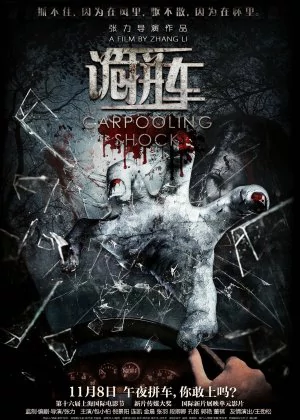Carpooling Shock
So far the recent wave of Chinese films hasn't done too much for the horror genre. While I've seen a couple already, most of them fail to truly engage, scare and/or immerse. Carpooling Shock [Gui Pin Che] is a welcome exception. While it caters to a very specific group of horror fans, Li Zhang proves he's more than a mere slave to the genre he operates in. Horror fans would do well to take a little chance with this film.

Much like their Hong Kong counterparts, Chinese horror films have a tough time capturing the hearts of Western viewers. While it would be easy to lump both niches together, China does produce noticeably different horror films from Hong Kong. The better entries in the genre (films like Curse of Lola and The House) usually offer a stylish mix of ghost stories with dark fantasy and drama influences. Quite a bit like recent Spanish horror films, but with a more Eastern atmosphere.
Carpooling Shock definitely falls in this category, only the visual language is a little different from its counterparts. The story though is exactly what you'd expect from a Chinese horror flick. A group of five young people venture into the Chinese mountains, carpool-style. It doesn't take too long before the car breaks down in a major thunderstorm, leaving them stranded. While remote, the area isn't completely uninhabited and the group is rescued by a famous composer living nearby.
But once they enter the composer's house, people start disappearing fast. First the wife of the composer disappears, then one by one the others are isolated and carried off by an unknown assailant. Only two of them manage to escape, but instead of fleeing for safety they go back to uncover the mystery of the house. It's nothing a particularly fancy setup, but it creates a perfect setting for Zhang to go wild.

This may be a mere horror flick, but be sure to pay attention during the first 15 minutes. The editing is lightning fast and what happens during the first 5 minutes alone could probably serve to fill a 90 minute film. Not only that, Zhang also makes sure that all the shots are actually worth watching. Even though the camera is agile, the lighting and camera angles are well thought out and make for beautiful images. Quite a feat for a film that cuts between shots almost ever 5 seconds. The pacing does slow down around halfway, but Zhang's visual prowess remains throughout the entire film.
The soundtrack is way more traditional, switching between more generic (modern) horror fare and classical pieces (using the composer's virtual work). It's a solid mix that gives the film some extra class, but if you look close enough you'll quickly notice that there isn't too much originality in the sound department. While a little simple overall, the effect is there and the score does what it's supposed to do.
As for the acting, there's a good balance of slight comic relief (with some traditional over-acting as a result) and more serious business. The comic interludes are very limited though, once the horror part starts these characters are the first to go while the remainder of the cast hangs around to tackle to the more serious bits of the film. A smart choice that makes sure both aspects don't drag each other down.

The finale plays out like you'd expect (at least, if you're familiar with these types of horror films). More drama than horror, Zhang knows to mould the closing act in an engaging way. While there are no real surprises or twists, the drama behind the horror is actually touching. I'll even forgive him his rather direct nod to Hitchcock at the very end of the film, a somewhat unnecessary addition I feel Zhang should kept for his interviews.
Carpooling Shock is not exactly new territory for horror adepts, but the overall presentation reveals a director with vision. While Zhang goes through the motions of the genre, he does so with considerable flair and gusto, upgrading the end result to something that kept me interested from start to finish. As usually the case with modern Chinese cinema, finding this film will prove to be the biggest challenge, but it's worth the effort if you're looking for a good, solid horror flick with some smart touches.
